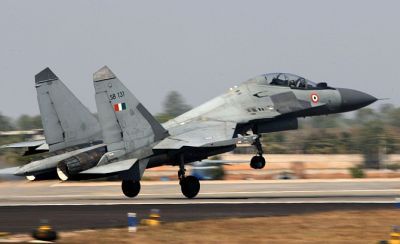 Russia has blamed "human factor" for the crash of a Sukhoi 30 MKI fighter aircraft in October last year that led to the grounding of the entire fleet of India's frontline fighter plane for a month, a charge denied by the Indian Air Force.
Russia has blamed "human factor" for the crash of a Sukhoi 30 MKI fighter aircraft in October last year that led to the grounding of the entire fleet of India's frontline fighter plane for a month, a charge denied by the Indian Air Force.
"Our stand is human factor," said Vitaly Borodich, Vice Presdient (Military Sales) of Irkut Corporation.
Irkut is the subsidiary of Russia's state-run United Aircraft Corporation which is the umbrella organisation of that country's aerospace industry.
Borodich claimed that the IAF has also accepted that it is human factor.
"They (IAF) do accept and, therefore the aircraft is in operation," he said, briefing a group of journalists on the sidelines of the Aero India air show.
However, the IAF, which has ordered a Court of Inquiry on the crash, denied that any final conclusion has been arrived at.
Noting that the incident relates to "inadvertent firing" of ejection seat of the plane, Air Force Chief Arup Raha said India has had similar incidents or accidents in the past.
"In this case, we have done a thorough investigation but it is not yet complete. A final report is yet to come. But, we did not really find anything wrong with the system.
"And it does not, of course, indicate that there is a human error or a pilot error," he said.
Raha underlined that there had been instances when such inadvertent firing had taken place.
"That goes to show there is something wrong since we did not find anything wrong in system per se, mechanical part, servicing part as well as electrical part of the ejection system.
"The CoI is yet to find an exact reason. We are yet to decide how to pinpoint exactly," he said.
Asked if the IAF has ruled out deliberate ejection, he said it has.
"We have not been able to find any fault with the system as of now. But this thing has happened. We have historical evidence of the seat having malfunctioned in the past.
"So that is a good ground to say that there has been something wrong," he told reporters.
Russian experts, including Borodich, had flown down to India to assist in the inquiry.
Borodich said the Russian stand has come after a thorough study of all record and technical inspection.
The IAF had claimed that the crash happened due to the "automatic ejection" of the pilot seat while landing near Pune in October.
Following the crash, the entire SU-30 fleet was grounded for a month before being allowed to fly again in November. It was the longest period for which the fleet was grounded since 2009 when its operation was suspended for nearly three weeks following an accident.
The aircraft was being flown by two officers -- Wing Commander Sidharth Vishwas Munje and Flying Officer Anup Singh -- when the crash took place last year.
Wing Commander Munje, who was the senior pilot on the aircraft, had been involved in the first-ever crash of a Sukhoi 30 fighter plane in 2009 when his co-pilot was killed.
The Court of Inquiry into the crash had found that the officer had mistakenly switched off the fly-by-wire systems of the warplane, causing the crash.
While a design change was made by putting a sheath on the fly-by-wire switch to prevent any such incident, it was found that the co-pilot died as an ejection seat harness broke due to excessive exposure to the Sun.
India has a total of 272 SU 30 MKI planes on order, making it the largest operator of the fighter aircraft type in the world.
The plane is also the IAF's most modern fighter jet tasked with frontline duties.











 © 2025
© 2025